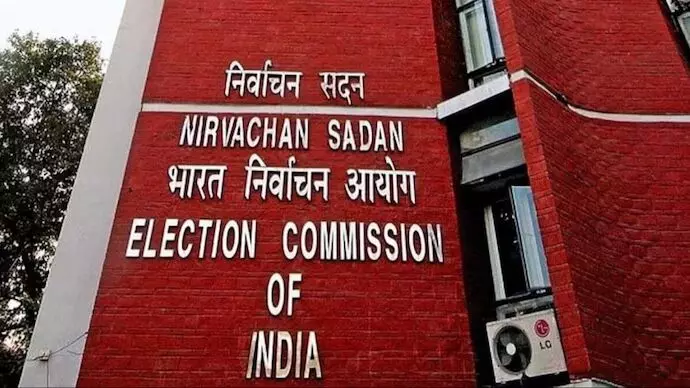EC slams Congress, says Haryana poll fraud claims ‘unfounded & frivolous’

New Delhi: The Election Commission on Tuesday dismissed allegations made by the Congress regarding irregularities in the Haryana Assembly elections held on October 5. The commission accused Congress of attempting to cast “a smoke of a generic doubt” over the entire electoral process, likening it to similar allegations the party has raised in recent years. The EC’s response was delivered in an eight-page letter addressed to Congress President Mallikarjun Kharge, describing the concerns as “frivolous and unfounded.”
The ruling Bharatiya Janata Party (BJP) retained power in Haryana by winning 48 of the 90 Assembly seats. Congress won 37 seats, the Indian National Lok Dal (INLD) secured two seats, and Independents took the remaining three. However, Congress had alleged “irregularities” during the counting process, citing instances where the control units of electronic voting machines (EVMs) showed a 99 per cent battery status, leading to concerns about possible tampering.
Congress argued that such readings could indicate that the control units had been replaced or interfered with.
In response, the Election Commission firmly dismissed these allegations. The letter highlighted: “Embedded in this concern was the apprehension of replacement of control unit itself,” adding that such claims are “least expected of a national political party.”
The commission underscored that these types of accusations risk “creating turbulence” during the most sensitive stages of the electoral process. “Such frivolous and unfounded doubts have the potential of creating turbulence when crucial steps like polling and counting are in live play,” the EC wrote, noting that these stages
Are periods of heightened anxiety for both the public and political parties.
In the letter, the EC urged Congress to refrain from casting aspersions on the credibility of the electoral process without substantiated evidence. It stated: “The commission appreciates the criticality of the considered views of political parties in sustaining and strengthening electoral democracy in the country and assures that it will remain committed towards timely grievance redressal.”
However, it also emphasised that “once again,” Congress has “raised the smoke of a generic doubt” without any evidence of statutory electoral steps being compromised.
The poll authority further encouraged the Congress to “take firm and concrete steps, matching with the party’s long and illustrious standing,” suggesting that the party should amend its approach when raising concerns about the electoral process. This, the commission argued, would help preserve the credibility and integrity of India’s democratic processes.
In its statement, the EC also detailed the steps taken by returning officers in the 26 Assembly constituencies where Congress alleged irregularities. The commission highlighted that a thorough re-verification of the electoral process was conducted and that each step was deemed “flawless.” The re-verification process included the involvement of authorised party representatives at every stage, ensuring transparency.
The poll authority disclosed that its officials had submitted a 1,600-page response, supported by evidence indicating that representatives of party candidates were present during all stages of the process, from EVM commissioning to the final vote count.
Rubbishing the claims surrounding battery status displays on EVMs, the EC clarified that the battery level displayed on the EVM’s control unit holds no relevance to vote count accuracy or integrity.
According to the commission: “The display of the status of battery on the control unit is solely a feature to assist technical teams in monitoring power levels, ensuring that device functions smoothly throughout polling operations.”
Dismissing any connection between battery levels and voting outcomes, the EC described such insinuations as “preposterous.”
The commission’s letter also addressed what it described as Congress’s repeated attempts to cast doubt on ordinary aspects of the EVM system. According to the EC, Congress has consistently raised questions on routine procedural aspects, positioning them as matters of electoral concern. The letter also cited a summary of 42 judgments by constitutional courts, all of which
have previously reviewed and upheld the credibility of the EVM system.
In conclusion, the EC reiterated its commitment to upholding transparency and integrity in India’s electoral process while encouraging political parties to engage constructively with the poll authority rather than undermining public confidence in the voting system.



